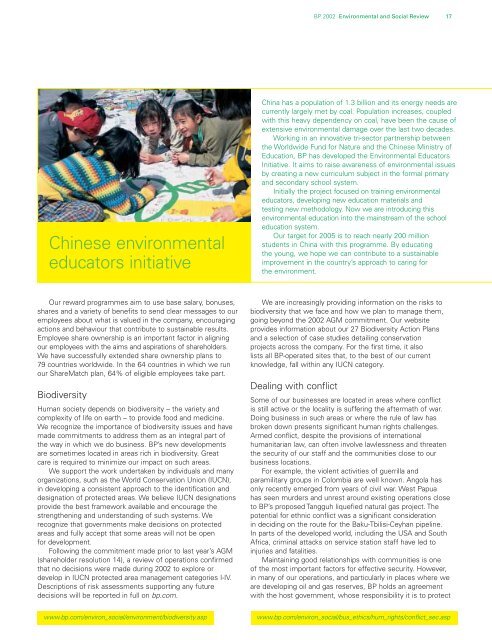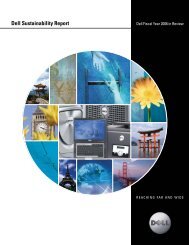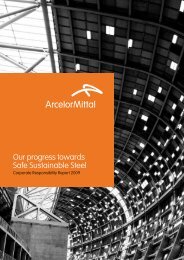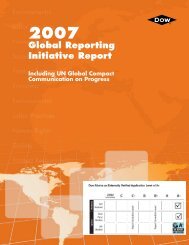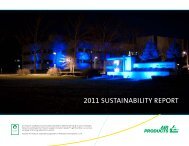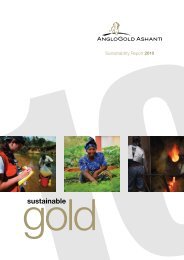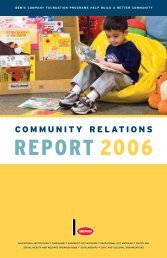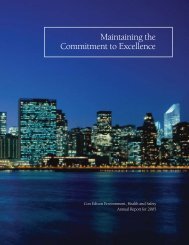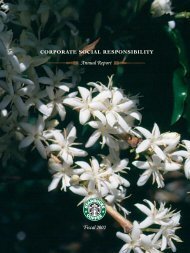English (pdf, 894KB) - BP
English (pdf, 894KB) - BP
English (pdf, 894KB) - BP
Create successful ePaper yourself
Turn your PDF publications into a flip-book with our unique Google optimized e-Paper software.
<strong>BP</strong> 2002 Environmental and Social Review 17Chinese environmentaleducators initiativeChina has a population of 1.3 billion and its energy needs arecurrently largely met by coal. Population increases, coupledwith this heavy dependency on coal, have been the cause ofextensive environmental damage over the last two decades.Working in an innovative tri-sector partnership betweenthe Worldwide Fund for Nature and the Chinese Ministry ofEducation, <strong>BP</strong> has developed the Environmental EducatorsInitiative. It aims to raise awareness of environmental issuesby creating a new curriculum subject in the formal primaryand secondary school system.Initially the project focused on training environmentaleducators, developing new education materials andtesting new methodology. Now we are introducing thisenvironmental education into the mainstream of the schooleducation system.Our target for 2005 is to reach nearly 200 millionstudents in China with this programme. By educatingthe young, we hope we can contribute to a sustainableimprovement in the country’s approach to caring forthe environment.Our reward programmes aim to use base salary, bonuses,shares and a variety of benefits to send clear messages to ouremployees about what is valued in the company, encouragingactions and behaviour that contribute to sustainable results.Employee share ownership is an important factor in aligningour employees with the aims and aspirations of shareholders.We have successfully extended share ownership plans to79 countries worldwide. In the 64 countries in which we runour ShareMatch plan, 64% of eligible employees take part.BiodiversityHuman society depends on biodiversity – the variety andcomplexity of life on earth – to provide food and medicine.We recognize the importance of biodiversity issues and havemade commitments to address them as an integral part ofthe way in which we do business. <strong>BP</strong>’s new developmentsare sometimes located in areas rich in biodiversity. Greatcare is required to minimize our impact on such areas.We support the work undertaken by individuals and manyorganizations, such as the World Conservation Union (IUCN),in developing a consistent approach to the identification anddesignation of protected areas. We believe IUCN designationsprovide the best framework available and encourage thestrengthening and understanding of such systems. Werecognize that governments make decisions on protectedareas and fully accept that some areas will not be openfor development.Following the commitment made prior to last year’s AGM(shareholder resolution 14), a review of operations confirmedthat no decisions were made during 2002 to explore ordevelop in IUCN protected area management categories I-IV.Descriptions of risk assessments supporting any futuredecisions will be reported in full on bp.com.We are increasingly providing information on the risks tobiodiversity that we face and how we plan to manage them,going beyond the 2002 AGM commitment. Our websiteprovides information about our 27 Biodiversity Action Plansand a selection of case studies detailing conservationprojects across the company. For the first time, it alsolists all <strong>BP</strong>-operated sites that, to the best of our currentknowledge, fall within any IUCN category.Dealing with conflictSome of our businesses are located in areas where conflictis still active or the locality is suffering the aftermath of war.Doing business in such areas or where the rule of law hasbroken down presents significant human rights challenges.Armed conflict, despite the provisions of internationalhumanitarian law, can often involve lawlessness and threatenthe security of our staff and the communities close to ourbusiness locations.For example, the violent activities of guerrilla andparamilitary groups in Colombia are well known. Angola hasonly recently emerged from years of civil war. West Papuahas seen murders and unrest around existing operations closeto <strong>BP</strong>’s proposed Tangguh liquefied natural gas project. Thepotential for ethnic conflict was a significant considerationin deciding on the route for the Baku-Tbilisi-Ceyhan pipeline.In parts of the developed world, including the USA and SouthAfrica, criminal attacks on service station staff have led toinjuries and fatalities.Maintaining good relationships with communities is oneof the most important factors for effective security. However,in many of our operations, and particularly in places where weare developing oil and gas reserves, <strong>BP</strong> holds an agreementwith the host government, whose responsibility it is to protectwww.bp.com/environ_social/environment/biodiversity.aspwww.bp.com/environ_social/bus_ethics/hum_rights/conflict_sec.asp


